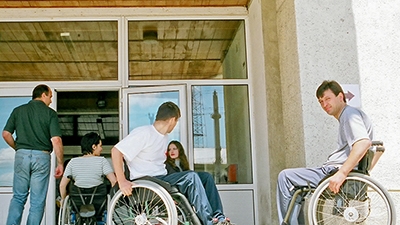LAMP is designed to advance real estate cadaster creation, improve registration of services, strengthen capacity to support the planning sector, and further develop the permitting process in Montenegro.
Since the project’s inception in 2008, more than 9,000 people have participated in debates on spatial and urban planning, helping to ensure that the concerns of all stakeholders are taken into consideration during project implementation and that the outcomes are as inclusive as possible. These efforts are helping to decrease illegal construction and ensure that buildings – especially public ones – are built according to code, thereby better serving the needs of everyone.
“I see improvement – both in the situation in general, as well as in people’s awareness,” said Dejan, following a recent meeting of the working group. “Through direct communication among the networks of Non-Governmental Organizations (NGOs), almost half of the people with disabilities in Cetinje had a voice in the planning process,” he continued.
In six years of implementation, the LAMP project has helped bring about a reduction of more than 88% in the construction of illegal buildings – and as a result, increase significantly the number of buildings that Dejan and other people with disabilities can now access more easily.
“Every time a new public building is made accessible, I feel that our needs are being reflected,” concludes Dejan.
The youth of Cetinje have also benefitted. Last year, a day care center for young people with disabilities opened in the town, with support from the local municipality, the Ministry of Social Care, and the United Nations Children’s Fund (UNICEF). The center accommodates up to 25 young people between the ages of 3 and 27 years, and provides help with their everyday needs.
The construction of the day care center, the huge reduction in illegal construction, and the enforcement of laws on spatial planning and construction of structures for accessibility are all highly positive developments for Cetinje, and ultimately for Montenegro.
The active participation of people like Dejan Tmusic in working groups that continue to influence these activities is also proof that a single voice, when multiplied several times over, can truly make a difference – for an individual, a community, and an entire country.

